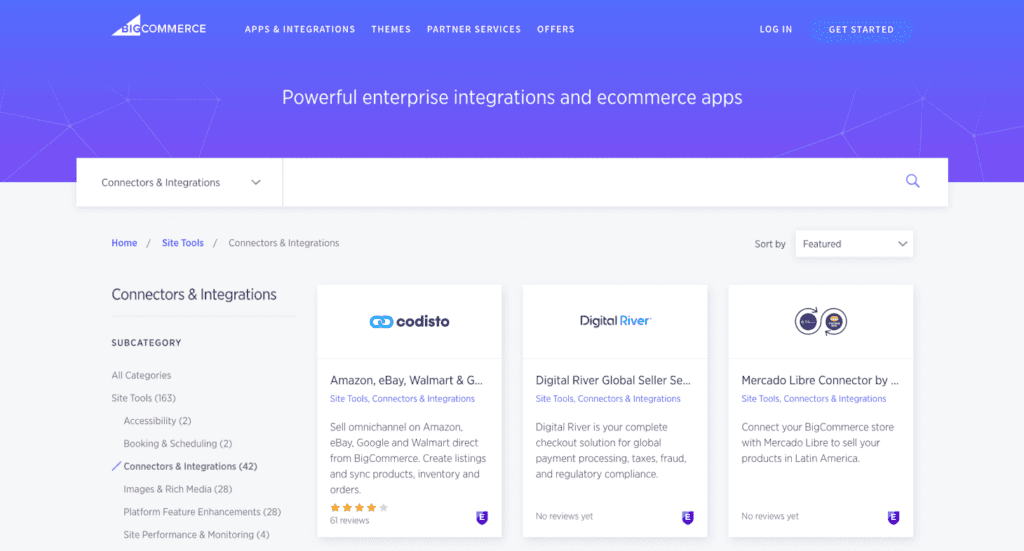Take thousands of retail locations, combine them with a multi-market ecommerce footprint, and then try to balance customer experience across all these touchpoints. Then add shoppers’ increasing appetite for fast delivery speeds — and you’ll get a good sense of what operating an enterprise-size commerce setup feels like.
Soundly, large-scale retail operations don’t have to be an uphill struggle. You have software, like ERP and 3PL apps, to streamline repetitive business processes.
Even better news? You can multiply the workforce efficiency by cross-integrating your toolkit with your BigCommerce store. This way, you can obtain a 360-degree view of your customer base and ensure excellence at every touchpoint.
BigCommerce Apps and Integrations: Overview
BigCommerce is an open SaaS ecommerce platform pre-packed with competitive core commerce features such as a native payment processor, multi-storefront, native CSR-generated quote management, and cross-border fulfillment capabilities, among other goodies.
BigCommerce has over 160 pre-made connectors with popular third-party apps for marketing, shipping, accounting, and more.

But what if you don’t see a pre-made integration with your preferred software? Do you have to retire the app and opt for a supported product?
Not at all. Thanks to an API-driven architecture, BigCommerce allows users to create custom integrations with other business systems to ensure seamless data exchanges.
7 Custom BigCommerce Integrations and Extensions to Consider
Perhaps you have found just the perfect ERP for your business. Or it is too time-consuming to train your sales team to use new CRM software. Or you already paid for your digital experience platform and don’t want to opt for another.
Since BigCommerce has well-documented APIs, there are no constraints to setting up custom integrations with your app of choice.
Except for one small one. You need someone experienced with API programming and the BigCommerce platform — which happens to be Edvantis.
Edvantis is a BigCommerce-certified technology partner. We have in-depth knowledge of their underlying technology and know our way around building custom integrations with other business systems. Our flexible and stackable services are easily tailored to the specific needs of our clients, whether they are small niche companies or large enterprises.
Our team rounded up seven custom BigCommerce extensions that are the most useful for automating data transfers, gaining visibility, making better business decisions, and saving your team time and effort.
1. Digital Experience Platform (DXP) Integration
A digital experience platform (DXP) is an advanced type of content management system. Gartner defines DXP as “an integrated set of core technologies that support the composition, management, delivery, and optimization of contextualized digital experiences.”
DXP helps you create more immersive, data-based, personalized shopping experiences for different customer cohorts — across channels, markets, and demographics. Not only do 70% of customers now expect personalized interactions by default, but 66% get frustrated when this doesn’t happen. And frustration isn’t the right sentiment for brokering a sale.
BigCommerce is one of the few SaaS platforms supporting headless architecture.
Headless allows you to use BigCommerce core commerce features on the back end. Then, integrate any DXP for all front-end interactions. This way, you can tailor your store layout and content to any new market or specific channel without extensive front-end development.
Here are some popular DXPs:
- Adobe Experience Manager
- Salesforce Experience Cloud
- Kentico Xperience
- Bloomreach Commerce Experience
- Sitecore Experience Platform (XP)
Is there another platform you plan to use? We can help you integrate it.
2. Custom Big Data Analytics Engine
Real-time customer intelligence enables better customer experiences and faster operating speed, ultimately driving higher revenues. So, unsurprisingly, at least half of digital leaders collect and analyze customer data every week.
However, big data volumes grow proportionally to your retail footprint.
Retailers have a lot of data siloed across multiple locations. The sheer data volumes make operationalization challenging, so off-the-shelf tools may not always come through. Hence, you may want to create a custom big data analysis process.
As part of our data science services, we help retailers develop a streamlined, secure process for analyzing data from multiple big data sources and using it in custom analytics models such as:
- Shopper behavior analysis
- Customer lifetime value (CLV) predictions
- Inventory management insights
- Path to purchase modeling
- Market basket analysis
- Baseline sales forecast at the SKU level
At first, we help you map all your data sources to understand where the best intel is stored. Then, we establish a robust data cleansing process to anonymize sensitive information. Finally, we can create custom data analytics models to supply your business with accurate intel.
This way, you can learn more about your target audiences, identify the most appropriate product pricing, enter new markets and channels, and develop high-performing marketing campaigns.
3. ERP System Integrations
An enterprise resource planning (ERP) system provides a 360-degree view of your entire retail business, enabling you to better plan, manage, and monitor your supply, logistics, inventory, and sales. So it only makes sense you would want to integrate it with your ecommerce platform to have complete visibility.
Іntegrating your ERP with BigCommerce will help your teams:
- Run cross-channel sales analytics
- Avoid overselling, delivery delays, and excessive backlog orders
- Maintain optimal inventory levels
BigCommerce has several pre-made connectors with ERP systems, like Microsoft Dynamic AX, MRPeasy, and Arizon Digital, to name a few. The platform does not, however, offer coverage for SAP — a leading enterprise ERP solution.
Here’s a sample pattern of ERP integration with BigCommerce:
Source: BigCommerce
Integrating BigCommerce with SAP is a powerful combination since your ecommerce performance will be automatically monitored along with all other sales channels, no matter how many you have. You will get a unified view and simultaneous handling of your product data, stock, pricing, orders, delivery, and customers — all in one place.
4. CRM System Integrations
A customer relationship management (CRM) system is another technical backbone of your business. Integrating your CRM with your BigCommerce store helps you consolidate customer data from in-store, in-app, and marketplace-based purchases.
Three-quarters of retail leaders agree that such a consolidated view of customer information across the organization is critical to outstanding customer service.
Integrating your BigCommerce store with a CRM app enables:
- Better cross-sell/up-sell opportunity identification
- Personalized loyalty marketing
- Deeper customer journey analysis
- Consolidated customer behavior analytics
Salesforce and Zoho are two popular CRMs with pre-made connectors to BigCommerce. But you can integrate other products with our help.
5. 3PL Integrations
Ongoing supply chain disruptions, rising logistics costs, and increasing customer demands push enterprises to diversify how they store and deliver goods. For instance, shipping speed is essential to consumers: 30% would pay more for same-day shipping, and 65% would pay more for 1-2-day shipping.
That’s where third-party logistics (3PL) providers enter the game.
3PLs help retailers handle order fulfillment and last-mile logistics. Integrating your 3PL app with your BigCommerce store also minimizes manual work.
This way, a provider gets all the customer details automatically in the given region right after a customer places an order. You can also enable same-day or next-day deliveries and manage returns and exchanges locally.
BigCommerce has a bunch of pre-made connectors with popular 3PL companies. However, these are mostly US players.
So, if you need a regional or a global 3PL provider, Edvantis can help set up a custom integration between your store and 3PL software.
6. POS Integration
Point of sales (POS) data provides extra insight into your customers’ shopping habits. Yet 65% of retailers base store decisions on brick-and-mortar performance, and only 35% consider the impact on omnichannel sales.
Having a clear understanding of how online and offline sales work together will help you to create a consistent omnichannel experience. Plus, try innovative offerings like BOPIS or provide competitive buy-now, pay-later schemes at POS.
A BigCommerce POS integration enables you to:
- Sync catalog between your web, mobile, and brick-and-mortar stores
- Get real-time automatic inventory updates and avoid overselling
- Offer cross-channel loyalty programs, discounts, and promotions
- Learn how customers shop online vs. offline
- Constantly improve the customer experience based on real-time data
POS systems come in different shapes, sizes, and configurations. Also, Different regulations apply to POS operators, depending on the country, so there will be specific requirements for APIs. We at Edvantis have both BigCommerce and payment expertise, so we can build a custom connector for your POS system.
7. Custom Marketing Integrations
McKinsey estimated that market leaders secure 40% more revenue from personalized marketing campaigns. Yet personalized marketing requires good data.
The data you collect from your online store can help you create more effective marketing campaigns. So, it only makes sense to develop a data pipeline to funnel your ecommerce data to your tools of choice.
Using data and tools together, you can create personalized ads, plan marketing campaigns, or decide to which customer segments to send promotions and discounts and when is the best time to do it.
BigCommerce supports:
- Email marketing integrations enable you to run up-sell, cross-sale, and seasonal promo campaigns for different audience segments.
- Marketing automation tools accelerate and streamline repetitive marketing tasks like lead prioritization, prospecting, and follow-ups.
- A host of other digital marketing tools for SEO paid ads campaign management and conversion rate optimization (CRO), among others.
That said, BigCommerce doesn’t have pre-made integrations with every marketing app. If you have one on your mind but wonder how to integrate it, ask your technology partner to help you.
Final Thoughts
Considering retail competition is on the rise, it makes sense that you would strive to offer a top-notch customer experience. With so many tech tools, you and your teams can run your ops faster and more efficiently. However, these tools do not always work in harmony.
So let BigCommerce be the uniting force between most of your tools. The ecommerce platform is exceptionally flexible and allows custom integrations tailored to your needs. And Edvantis can be your trusted tech partner to perform integration work.
Have you got some questions left? Contact us to get a personalized consultation on BigCommerce integration options.


